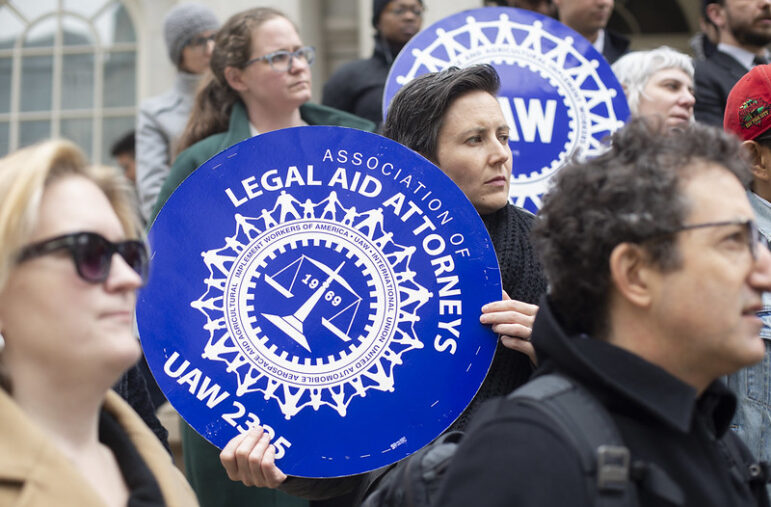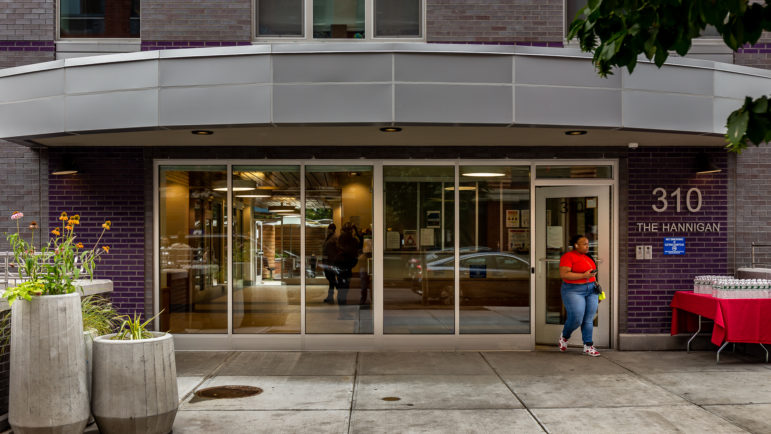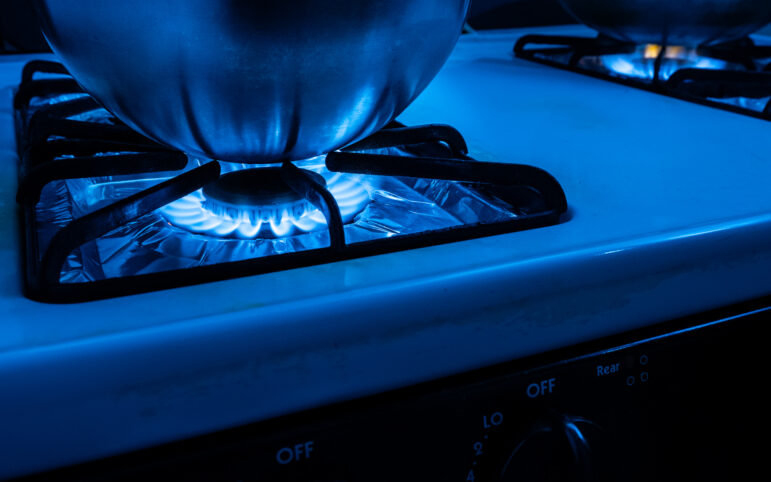“If the city fails to act this year, it will send an unmistakable message to public defenders and the New Yorkers they serve that their rights to due process, family integrity, safety, and freedom are not valued.”

John McCarten
A 2019 rally at City Hall calling for better pay for the city’s public defenders.New York City’s broken contracting system has plunged public defender offices into a manufactured financial crisis. It’s a systemic failure that city officials have known about but failed to correct for years—and which persists today despite the Adams administration’s efforts.
But this is a make-or-break moment—if the city fails to act this year, it will send an unmistakable message to public defenders and the New Yorkers they serve that their rights to due process, family integrity, safety, and freedom are not valued.
The city has long recognized the importance of funding public defense to protect people’s rights to due process and equal protection under the law. Yet the city’s failure to pay organizations on time, even for work already completed, betrays that understanding.
According to data from PASSPort NYC and this month’s Comptroller’s report, the city’s contracting system is plagued by delays. On average, it takes nearly 10 months to register a contract. Even after registration, payments are often delayed further. As a result, 40 percent of human services contracts are not paid for over a year. This has forced defender offices to turn to philanthropic grants or private loans to cover payroll and other critical expenses.
In turn, philanthropic organizations frequently ask why they should shoulder the financial burden of services the government is legally obligated to provide. And when loans become the only option to meet payroll, defender offices incur exorbitant interest rates, adding unnecessary costs to already strained budgets. Having to rely on private funding sources to cover the government’s payment delays is unsustainable and deeply unfair.
Compounding the issue: wages have not kept up with inflation at a time when the city is grappling with an affordability crisis. It also doesn’t help that public defender workers in other major cities like Los Angeles and San Francisco are paid far better than those here. As are other defenders in the state, like federal defenders, who handle a mere fraction of the cases that overwhelm our offices and deeply traumatize entire communities.
As public defenders, we should be devoting all our time to defending people in court in service of the broader aims of justice. Whether it’s fighting an unwarranted arrest, family separation, eviction, or deportation, our work is about liberating people from the devastating consequences of legal entanglement. We should not have to fight to be paid on time and fairly to protect rights to due process and equal protection that the city itself recognizes as fundamental to the operations of justice.
Thankfully, the solutions to this crisis are neither new nor complicated. They have been proposed repeatedly and can be implemented swiftly. First, the city must institute longer contract periods and accountability measures for late registrations and payments. This should include covering the interest on loans that organizations are forced to take out due to delayed payments. Second, public defender offices should receive a 50 percent advance on contracts to ensure sufficient cash to cover payroll while waiting for contract registration. Finally, contract funding must be adjusted annually to reflect inflation.
These solutions are actionable and feasible. What’s missing is the political will to implement them. Failure to act doesn’t just harm public defender offices and their workers. It harms the New Yorkers represented by these offices. When the government fails to uphold its commitments, it’s the people who suffer—the very New Yorkers who desperately need legal representation or services to defend their rights and livelihoods.
Public defense attracts brilliant, passionate, and committed advocates. But passion should not be mistaken for a willingness to endure financial duress and instability. Defenders should not have to worry about whether city funding will affect their ability to make ends meet or force them to choose between fighting for the people they represent and addressing systemic underinvestment in public defense.
That is why New York City’s public defender offices—the overwhelming majority of which are represented by UAW Local 2325, the Association of Legal Advocates and Attorneys—and their management believe the city must fix the contracting system and pay workers fairly, and on time, so they can focus on delivering high-quality legal services.
New York City has a choice to make. It can continue to delay, perpetuating a system that fails its workers and its people. Or it can act decisively, implementing long-overdue reforms that ensure public defender offices can do their jobs effectively.
The solutions are clear. The responsibility is undeniable. It’s time for the city to live up to its legal and moral obligations—to its workers, to its residents, and to the principles of justice and fairness it claims to uphold.
Juval O. Scott is executive director of The Bronx Defenders. Babatunde Aremu is president of The Bronx Defenders chapter of ALAA-UAW Local 2325.








